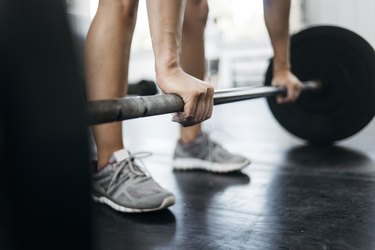
Picture this: You just finished a long, heavy leg workout. You probably did some squats, lunges and maybe even some burpees for good measure. What's the first noise you hear once you sit down in your car? Probably your growling stomach.
If this scenario sounds familiar, you're certainly not alone. Feeling hungry after lifting weights is a pretty common thing. Learn why your stomach grumbles after a strength workout and how to fuel for success.
Video of the Day
Video of the Day
Why Does Strength Training Make You Hungrier?
Finding your stomach grumbling after your strength-training sessions? Rest assured, you're in the majority. Feeling hungry after lifting weights is perfectly normal. And understanding a little more about your body can help you fuel properly for when the hunger hits.
When you strength train often, you damage your muscle fibers and your body repairs the tissues to build larger, stronger muscles, according to the University of New Mexico. Not only does this process (aka muscular hypertrophy) require fuel, it also helps increase your metabolism (more on that below), which can also make you feel hungrier.
How Your Metabolism Works
Your metabolism is a process in your body that changes your food into energy, according to the American Council on Exercise (ACE). Your body uses this energy to fuel your day-to-day activities. Those with a "faster" metabolic rate burn calories at a faster rate than those with a "slower" metabolism.
But the efficiency of your metabolism depends on a variety of factors which are totally out of your control, including your age, genetics and height, among others. However, there are some controllable lifestyle factors that can help increase your basal metabolic rate (the number of calories your body burns totally at rest).
Strength Training and Your Metabolism
Building more muscle improves your overall body composition (your body's ration of muscle to fat), which increases the rate at which your body burns calories, according to Caroline Araujo, CPT, a New York-based strength coach.
"When you lift weights and build muscle, you increase your metabolic rate," Araujo says. "If you're burning more calories in your day-to-day and while you exercise, you're going to feel hungrier and your body will demand more fuel."
Increasing your metabolism can make you feel hungrier. But this process doesn't happen overnight — building muscle can take quite a bit of time. Another reason you feel hungry after lifting weights may be caused by excess post-exercise oxygen consumption (EPOC).
Also known as after-burn, EPOC is the amount of oxygen your body needs to return to its normal, resting metabolic state, according to the American Council on Exercise (ACE). This process causes your body to continue burning calories even after your workout is over.
Heavy resistance training can cause a pretty big EPOC effect, meaning your body needs to burn a lot of post-workout calories to return to normal. And when your boy burns extra calories, you can start to feel hungrier after your lifts.
Fueling for Muscle Building
Now that you know why you're feeling ravenous after a workout, you can take steps to help minimize your hunger levels.
"Hunger or cravings after a workout often leads my hands straight to my snack pantry," Araujo says. "But when I fuel properly before and after my workout, I'm able to keep cravings controlled and give my body the nutrients it needs to build muscle and recover.
Getting All Your Macronutrients
Eating balanced meals can help stave off hunger and that includes sources of protein, carbohydrates and fat. While you want a bit of all three, protein and carbs should be your main focus for building muscle.
Protein is a satiating nutrient and it's crucial for proper recovery and strength gain, according to the National Academy of Sports Medicine (NASM). Generally you want to get between 0.7 grams and 0.8 grams of protein per pound of bodyweight. So, a 200-pound person would need between 140 grams and 160 grams of daily protein.
Despite what some buzzy diets may say, lack of post-workout carbs can actually slow your muscle growth, per the NASM. You should aim to get roughly 1.8 grams to 3.2 grams of carbohydrates per pound of bodyweight each day. Again, for a 200-pound person, that's about 360 grams to 640 grams of daily carbs.
Foods for Building Muscle
There's no one recipe or ideal food for gaining strength, Araujo says. But as much as possible, try to avoid highly processed foods.
"Protein bars can be helpful when you're on-the-go, but often, processed foods don't offer as many nutrients and minerals as whole foods," she says. "So, try your best to choose single-ingredient sources of protein, carbs and fats after your workout."
While red meat is absolutely ok every now and again, try to focus on lean protein sources after you train. Poultry, eggs and Greek yogurt are all foods to keep stocked in your fridge for a quick meal after the gym, according to the Mayo Clinic.
For carbohydrates, try to avoid processed carbs, as they're usually high in sugar. Instead, opt for whole grains or single-ingredient carbs, including whole-grain bread or pasta, sweet potatoes and brown rice or quinoa.
Although fats aren't as crucial where muscle is concerned, they do help stave off hunger. Choose healthy fat sources, like avocado, fish, nuts and seeds, the Mayo Clinic recommends.
- University of New Mexico: "The Mystery of Skeletal Muscle Hypertrophy"
- ACE: "Maximize Your Metabolism"
- Ace: "7 Things to Know About Excess Post-exercise Oxygen Consumption (EPOC)"
- NASM: "Meals for Gaining Muscle: The Right Nutrition for Muscle Growth"
- Mayo Clinic: "Nutrition Rules That Will Fuel Your Workout"